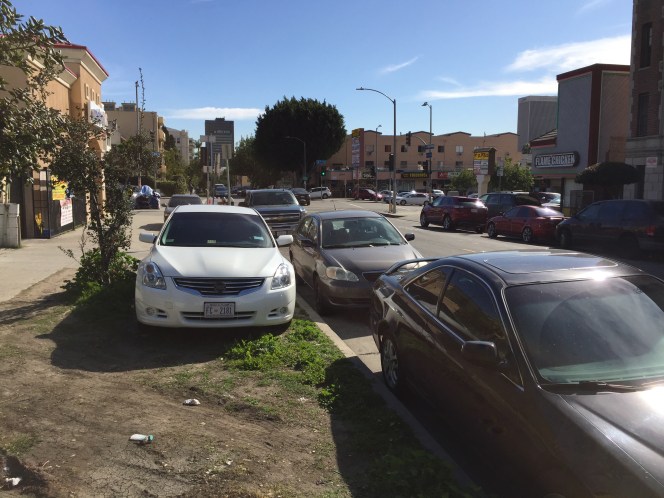A couple weeks ago, I was bicycling in a hurry to get somewhere, and caught a few seconds of a conflict between a driver and a pedestrian. The location was the corner of First Street and New Hampshire Avenue in Koreatown, right across the street from Frank Del Olmo Elementary School. The time was early afternoon; school had just let out.
The conflict was a little different than most driver-pedestrian conflicts in that both the car and the pedestrian were on the sidewalk.
The driver had been parked in the parkway and seemed to be in a hurry to drive away—using the sidewalk to get to the street. There were actually three pedestrians: a mother with two children holding her hands.
The driver's car was blocking the sidewalk. His window was rolled down and he was yelling. The pedestrian was on the sidewalk yelling at the driver. Other parents were walking their kids around the sidewalk-hogging car. I was tempted to yell at the driver myself, but I was in a rush.
This kind of crystallized some of the issues with parkway parking as recently profiled in a very good article by Laura Nelson in the L.A. Times. Nelson clarified something I hadn't been aware of when I raised the issue of increasing sidewalk and parkway parking in my neighborhood, and the proliferation of posts to prevent such parking. According to the Times:
For more than five years, the Los Angeles City Council has told parking officers not to ticket cars parked on parkways — an umbrella term that includes the public land between the sidewalk and the curb, as well as the sloping aprons that connect driveways to the street.
The council's 2011 decision to suspend parkway enforcement came in response to an outcry from residents who had been cited for parking on driveway aprons. A lull in enforcement, officials said, would give drivers some relief and give the city time to craft new policies.
But the five-year gap in enforcement has also encouraged a wave of renegade parkers in dense neighborhoods, who know that hopping the curb to park on the grass won’t lead to a ticket.
Further:
The [L.A. City] council vote to suspend parkway enforcement followed a series of civil rights lawsuits that claimed the city’s broken, sometimes impassable sidewalks violated the Americans with Disabilities Act. One of the cases, which will be settled pending court approval, alleged that apron parking also violated the act.
I don't doubt that the L.A. Times is right, but to me this sounds like pretty car-centric back-ass-ward anti-logic. When people in wheelchairs said they couldn't get around cars parked across sidewalks, the city council responded by telling police to take it easy on drivers. The council suspended enforcement of parking laws, because disabled people sued to get cars out of the way. Groan. Perhaps livability advocates could generate a lawsuit that appeared to be from downtown drivers, and a similarly illogical response could suspend LAPD "jaywalking" stings!
There are two types of parking violations here:
- Apron Parking: Cars parked in driveways, sometimes blocking sidewalks
- Parkway Parking: Cars parked in the parkway (the area between the sidewalk and the street) sometimes accessed via driving on the sidewalk
When issues arose with apron parking, the city suspended enforcement of both apron and parkway parking restrictions. The reason given, again according to the Times:
[O]fficials pointed out that the city’s municipal code contained conflicting definitions of “parkway,” which could make the law unenforceable.
I come at these parking problems as a person of privilege. As an able-bodied person who walks and bikes in my neighborhood, the cars in my way are a nuisance, but I can make my way around them, even when pushing my daughter in a stroller. I understand that many of these car owners don't have a lot of resources, and the drivers are doing the best they can. Paying for off-street parking would be a burden on them (though many people on my street rent off-street parking from a church.) Paying for parkway parking tickets could be a serious burden, if the city resumes enforcement.
But, as the shouting match I came across shows, there are consequences for ceding our sidewalks to cars.
Non-enforcement of parking laws effectively gives over our sidewalk public spaces to cars. Drivers are favored over pedestrians. And this has another class aspect to it: the poorest in my neighborhood don't have cars. So allowing drivers to take over public spaces means shifting space from the have-nots to the haves.
Koreatown is the most population-dense neighborhood in the city of Los Angeles. So much of our space already goes to streets, parking lots, drive-throughs, gas stations—with very little space for walking or bicycling. Ceding sidewalks and parkways to cars feels like one more blow against making my neighborhood more walkable. This is, first and foremost, a safety issue. The more we privilege drivers and disadvantage pedestrians, the more cars we get, the more lives traffic violence claims, the worse it gets for people on foot.
I urge the city council to resolve these thorny parking issues, and to make sure our sidewalks are accessible and safe for everyone.






